Mental Health Recovery Approach: Key Elements, Roles, and History
VerifiedAdded on 2022/08/24
|13
|2891
|24
Essay
AI Summary
This essay delves into the recovery approach to mental health, examining its key elements, including connectedness, hope, and empowerment. It differentiates between clinical and personal recovery, highlighting the shift towards individual-centered care. The essay traces the historical development of the recovery movement, emphasizing the influence of lived experiences and the evolving understanding of mental illness. It explores the crucial roles of individuals with lived experiences, nurses, and families in supporting patient recovery, emphasizing the importance of peer support, therapeutic relationships, and holistic care. The essay underscores the significance of family involvement and the need for a collaborative approach to mental health treatment.
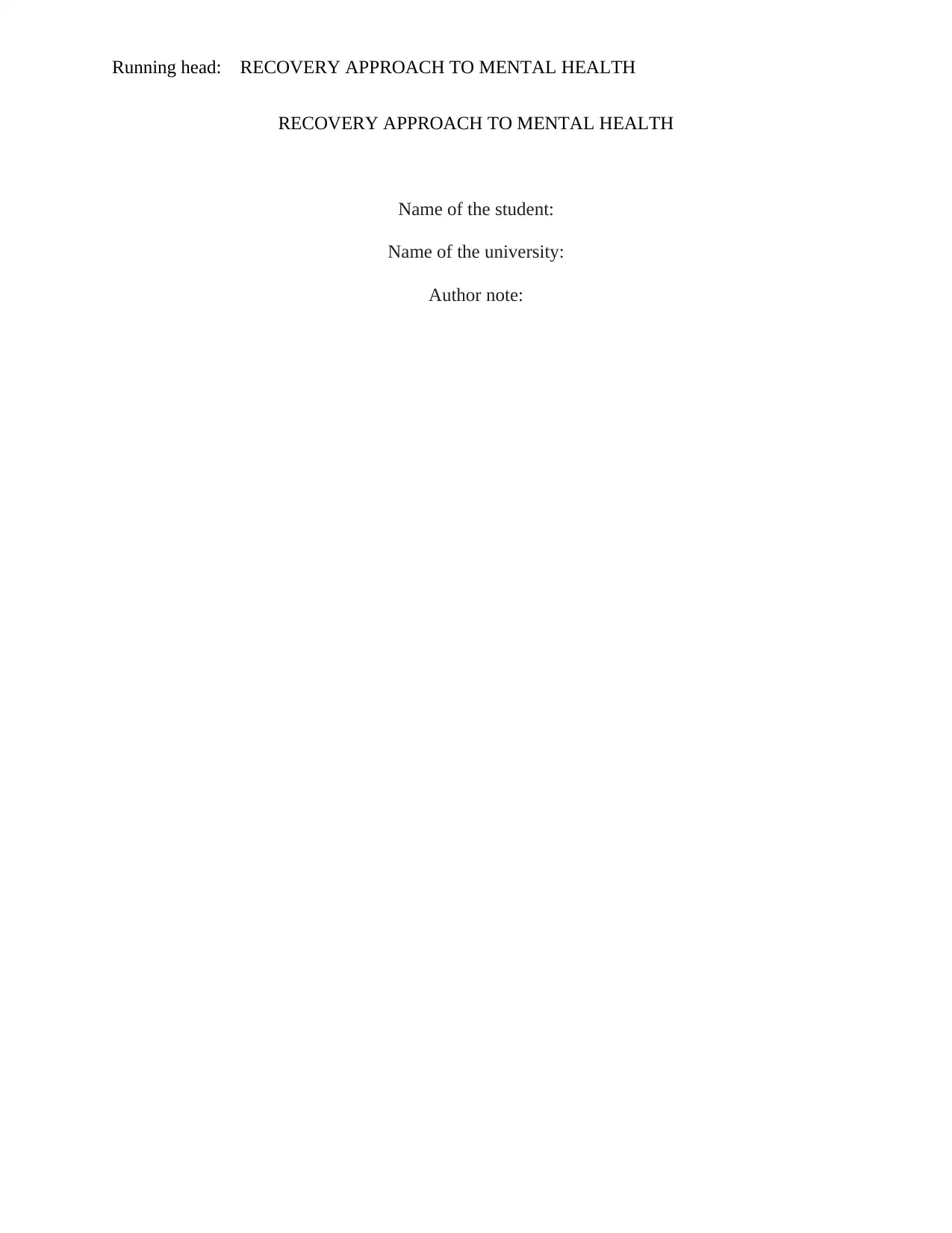
Running head: RECOVERY APPROACH TO MENTAL HEALTH
RECOVERY APPROACH TO MENTAL HEALTH
Name of the student:
Name of the university:
Author note:
RECOVERY APPROACH TO MENTAL HEALTH
Name of the student:
Name of the university:
Author note:
Paraphrase This Document
Need a fresh take? Get an instant paraphrase of this document with our AI Paraphraser
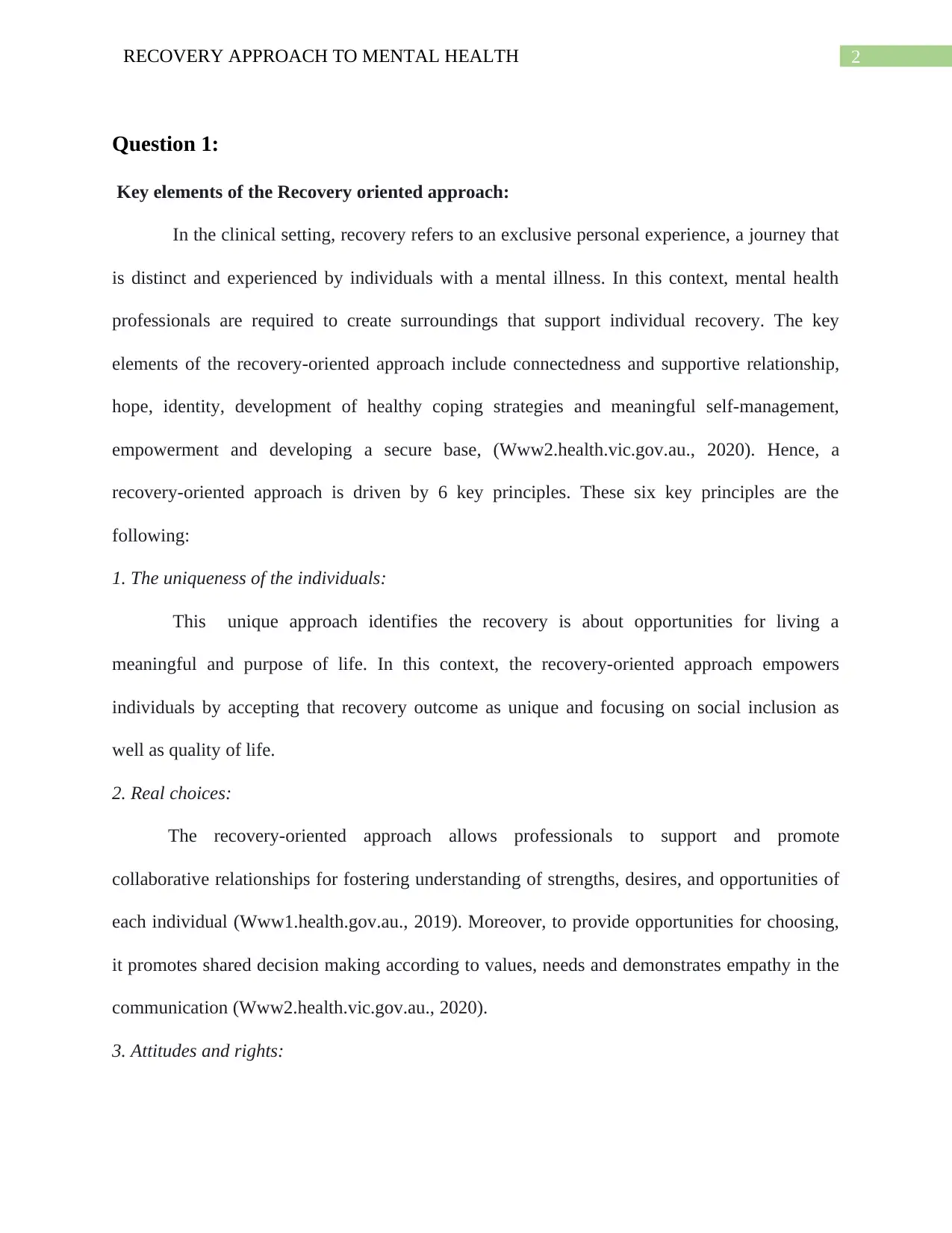
2RECOVERY APPROACH TO MENTAL HEALTH
Question 1:
Key elements of the Recovery oriented approach:
In the clinical setting, recovery refers to an exclusive personal experience, a journey that
is distinct and experienced by individuals with a mental illness. In this context, mental health
professionals are required to create surroundings that support individual recovery. The key
elements of the recovery-oriented approach include connectedness and supportive relationship,
hope, identity, development of healthy coping strategies and meaningful self-management,
empowerment and developing a secure base, (Www2.health.vic.gov.au., 2020). Hence, a
recovery-oriented approach is driven by 6 key principles. These six key principles are the
following:
1. The uniqueness of the individuals:
This unique approach identifies the recovery is about opportunities for living a
meaningful and purpose of life. In this context, the recovery-oriented approach empowers
individuals by accepting that recovery outcome as unique and focusing on social inclusion as
well as quality of life.
2. Real choices:
The recovery-oriented approach allows professionals to support and promote
collaborative relationships for fostering understanding of strengths, desires, and opportunities of
each individual (Www1.health.gov.au., 2019). Moreover, to provide opportunities for choosing,
it promotes shared decision making according to values, needs and demonstrates empathy in the
communication (Www2.health.vic.gov.au., 2020).
3. Attitudes and rights:
Question 1:
Key elements of the Recovery oriented approach:
In the clinical setting, recovery refers to an exclusive personal experience, a journey that
is distinct and experienced by individuals with a mental illness. In this context, mental health
professionals are required to create surroundings that support individual recovery. The key
elements of the recovery-oriented approach include connectedness and supportive relationship,
hope, identity, development of healthy coping strategies and meaningful self-management,
empowerment and developing a secure base, (Www2.health.vic.gov.au., 2020). Hence, a
recovery-oriented approach is driven by 6 key principles. These six key principles are the
following:
1. The uniqueness of the individuals:
This unique approach identifies the recovery is about opportunities for living a
meaningful and purpose of life. In this context, the recovery-oriented approach empowers
individuals by accepting that recovery outcome as unique and focusing on social inclusion as
well as quality of life.
2. Real choices:
The recovery-oriented approach allows professionals to support and promote
collaborative relationships for fostering understanding of strengths, desires, and opportunities of
each individual (Www1.health.gov.au., 2019). Moreover, to provide opportunities for choosing,
it promotes shared decision making according to values, needs and demonstrates empathy in the
communication (Www2.health.vic.gov.au., 2020).
3. Attitudes and rights:
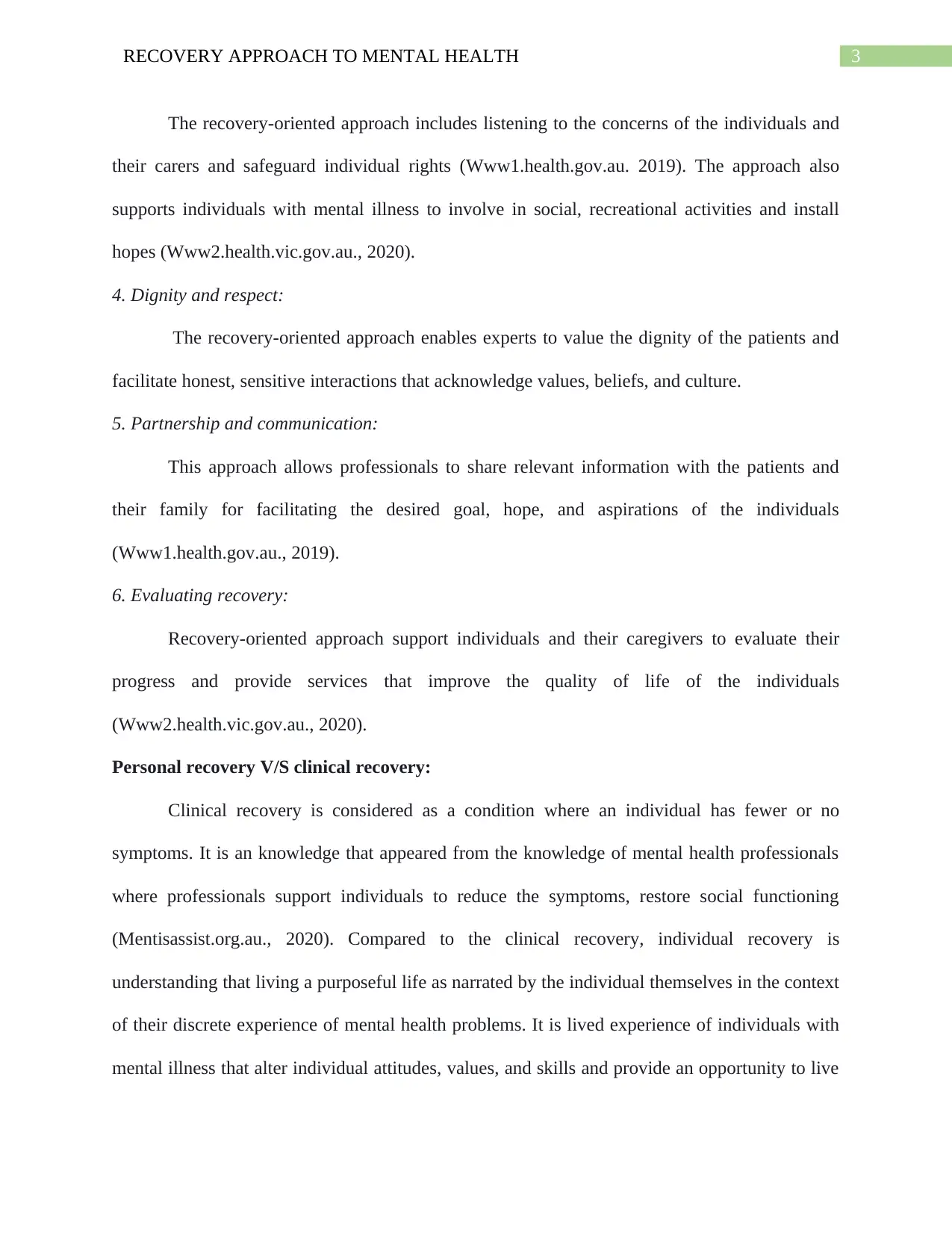
3RECOVERY APPROACH TO MENTAL HEALTH
The recovery-oriented approach includes listening to the concerns of the individuals and
their carers and safeguard individual rights (Www1.health.gov.au. 2019). The approach also
supports individuals with mental illness to involve in social, recreational activities and install
hopes (Www2.health.vic.gov.au., 2020).
4. Dignity and respect:
The recovery-oriented approach enables experts to value the dignity of the patients and
facilitate honest, sensitive interactions that acknowledge values, beliefs, and culture.
5. Partnership and communication:
This approach allows professionals to share relevant information with the patients and
their family for facilitating the desired goal, hope, and aspirations of the individuals
(Www1.health.gov.au., 2019).
6. Evaluating recovery:
Recovery-oriented approach support individuals and their caregivers to evaluate their
progress and provide services that improve the quality of life of the individuals
(Www2.health.vic.gov.au., 2020).
Personal recovery V/S clinical recovery:
Clinical recovery is considered as a condition where an individual has fewer or no
symptoms. It is an knowledge that appeared from the knowledge of mental health professionals
where professionals support individuals to reduce the symptoms, restore social functioning
(Mentisassist.org.au., 2020). Compared to the clinical recovery, individual recovery is
understanding that living a purposeful life as narrated by the individual themselves in the context
of their discrete experience of mental health problems. It is lived experience of individuals with
mental illness that alter individual attitudes, values, and skills and provide an opportunity to live
The recovery-oriented approach includes listening to the concerns of the individuals and
their carers and safeguard individual rights (Www1.health.gov.au. 2019). The approach also
supports individuals with mental illness to involve in social, recreational activities and install
hopes (Www2.health.vic.gov.au., 2020).
4. Dignity and respect:
The recovery-oriented approach enables experts to value the dignity of the patients and
facilitate honest, sensitive interactions that acknowledge values, beliefs, and culture.
5. Partnership and communication:
This approach allows professionals to share relevant information with the patients and
their family for facilitating the desired goal, hope, and aspirations of the individuals
(Www1.health.gov.au., 2019).
6. Evaluating recovery:
Recovery-oriented approach support individuals and their caregivers to evaluate their
progress and provide services that improve the quality of life of the individuals
(Www2.health.vic.gov.au., 2020).
Personal recovery V/S clinical recovery:
Clinical recovery is considered as a condition where an individual has fewer or no
symptoms. It is an knowledge that appeared from the knowledge of mental health professionals
where professionals support individuals to reduce the symptoms, restore social functioning
(Mentisassist.org.au., 2020). Compared to the clinical recovery, individual recovery is
understanding that living a purposeful life as narrated by the individual themselves in the context
of their discrete experience of mental health problems. It is lived experience of individuals with
mental illness that alter individual attitudes, values, and skills and provide an opportunity to live
⊘ This is a preview!⊘
Do you want full access?
Subscribe today to unlock all pages.

Trusted by 1+ million students worldwide
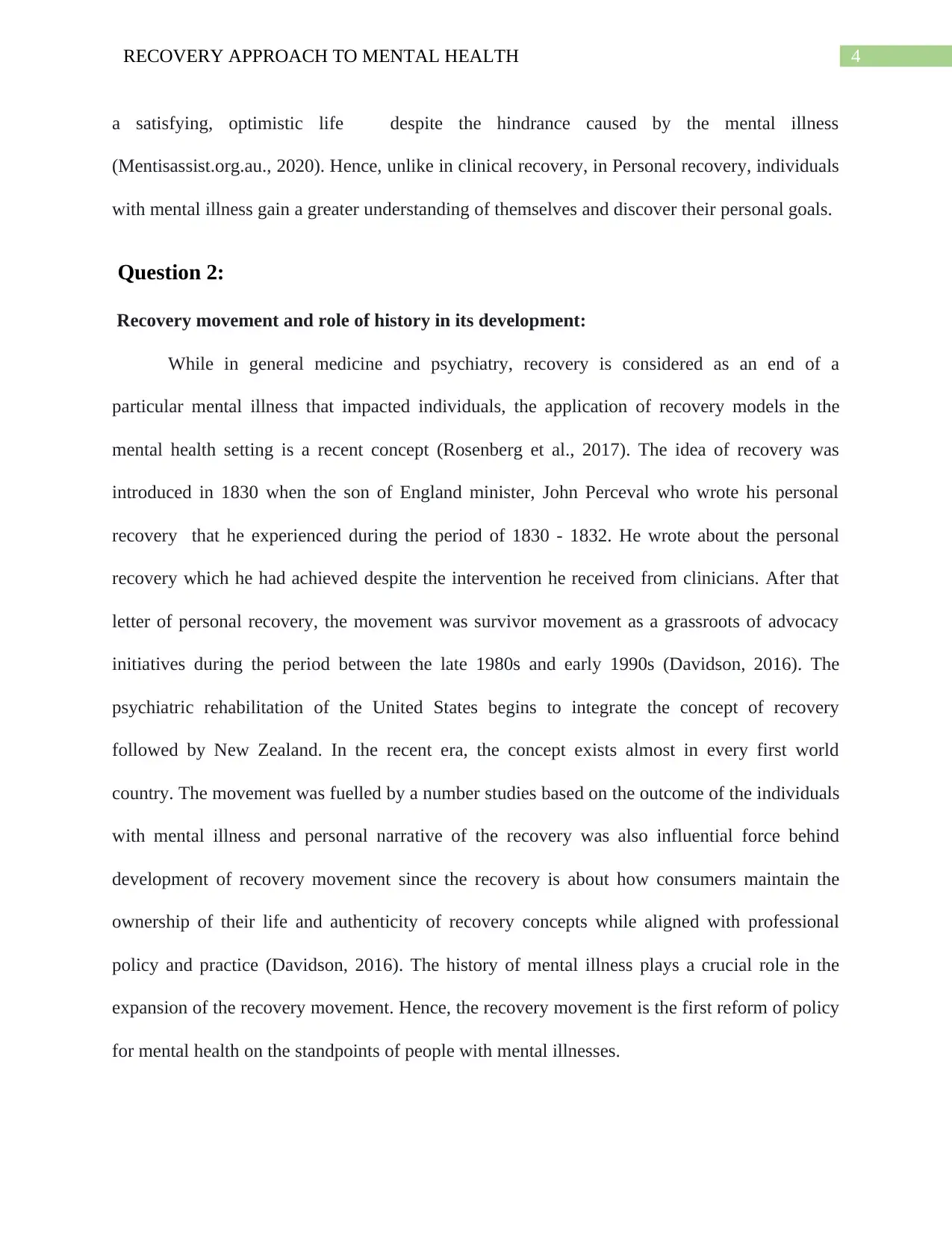
4RECOVERY APPROACH TO MENTAL HEALTH
a satisfying, optimistic life despite the hindrance caused by the mental illness
(Mentisassist.org.au., 2020). Hence, unlike in clinical recovery, in Personal recovery, individuals
with mental illness gain a greater understanding of themselves and discover their personal goals.
Question 2:
Recovery movement and role of history in its development:
While in general medicine and psychiatry, recovery is considered as an end of a
particular mental illness that impacted individuals, the application of recovery models in the
mental health setting is a recent concept (Rosenberg et al., 2017). The idea of recovery was
introduced in 1830 when the son of England minister, John Perceval who wrote his personal
recovery that he experienced during the period of 1830 - 1832. He wrote about the personal
recovery which he had achieved despite the intervention he received from clinicians. After that
letter of personal recovery, the movement was survivor movement as a grassroots of advocacy
initiatives during the period between the late 1980s and early 1990s (Davidson, 2016). The
psychiatric rehabilitation of the United States begins to integrate the concept of recovery
followed by New Zealand. In the recent era, the concept exists almost in every first world
country. The movement was fuelled by a number studies based on the outcome of the individuals
with mental illness and personal narrative of the recovery was also influential force behind
development of recovery movement since the recovery is about how consumers maintain the
ownership of their life and authenticity of recovery concepts while aligned with professional
policy and practice (Davidson, 2016). The history of mental illness plays a crucial role in the
expansion of the recovery movement. Hence, the recovery movement is the first reform of policy
for mental health on the standpoints of people with mental illnesses.
a satisfying, optimistic life despite the hindrance caused by the mental illness
(Mentisassist.org.au., 2020). Hence, unlike in clinical recovery, in Personal recovery, individuals
with mental illness gain a greater understanding of themselves and discover their personal goals.
Question 2:
Recovery movement and role of history in its development:
While in general medicine and psychiatry, recovery is considered as an end of a
particular mental illness that impacted individuals, the application of recovery models in the
mental health setting is a recent concept (Rosenberg et al., 2017). The idea of recovery was
introduced in 1830 when the son of England minister, John Perceval who wrote his personal
recovery that he experienced during the period of 1830 - 1832. He wrote about the personal
recovery which he had achieved despite the intervention he received from clinicians. After that
letter of personal recovery, the movement was survivor movement as a grassroots of advocacy
initiatives during the period between the late 1980s and early 1990s (Davidson, 2016). The
psychiatric rehabilitation of the United States begins to integrate the concept of recovery
followed by New Zealand. In the recent era, the concept exists almost in every first world
country. The movement was fuelled by a number studies based on the outcome of the individuals
with mental illness and personal narrative of the recovery was also influential force behind
development of recovery movement since the recovery is about how consumers maintain the
ownership of their life and authenticity of recovery concepts while aligned with professional
policy and practice (Davidson, 2016). The history of mental illness plays a crucial role in the
expansion of the recovery movement. Hence, the recovery movement is the first reform of policy
for mental health on the standpoints of people with mental illnesses.
Paraphrase This Document
Need a fresh take? Get an instant paraphrase of this document with our AI Paraphraser
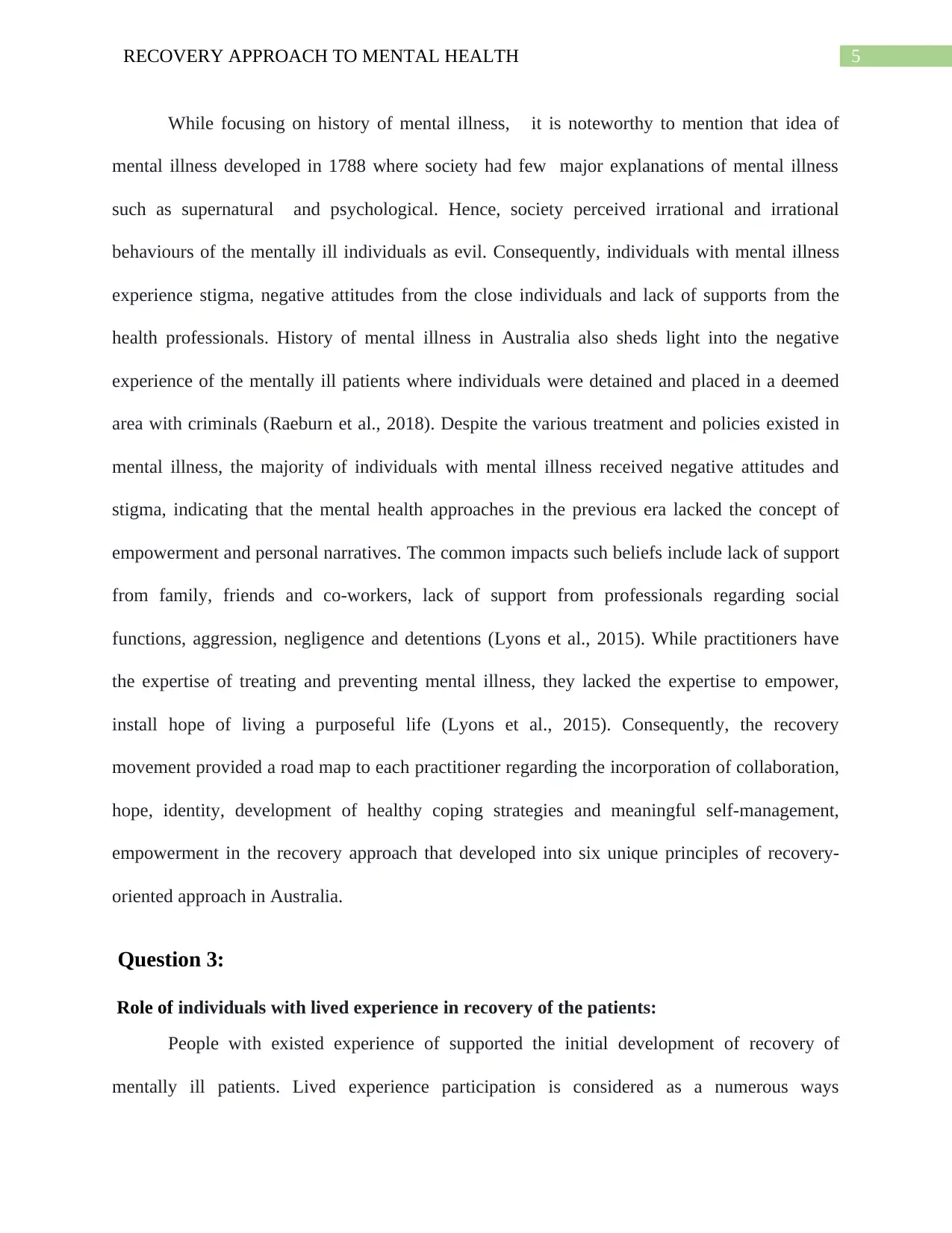
5RECOVERY APPROACH TO MENTAL HEALTH
While focusing on history of mental illness, it is noteworthy to mention that idea of
mental illness developed in 1788 where society had few major explanations of mental illness
such as supernatural and psychological. Hence, society perceived irrational and irrational
behaviours of the mentally ill individuals as evil. Consequently, individuals with mental illness
experience stigma, negative attitudes from the close individuals and lack of supports from the
health professionals. History of mental illness in Australia also sheds light into the negative
experience of the mentally ill patients where individuals were detained and placed in a deemed
area with criminals (Raeburn et al., 2018). Despite the various treatment and policies existed in
mental illness, the majority of individuals with mental illness received negative attitudes and
stigma, indicating that the mental health approaches in the previous era lacked the concept of
empowerment and personal narratives. The common impacts such beliefs include lack of support
from family, friends and co-workers, lack of support from professionals regarding social
functions, aggression, negligence and detentions (Lyons et al., 2015). While practitioners have
the expertise of treating and preventing mental illness, they lacked the expertise to empower,
install hope of living a purposeful life (Lyons et al., 2015). Consequently, the recovery
movement provided a road map to each practitioner regarding the incorporation of collaboration,
hope, identity, development of healthy coping strategies and meaningful self-management,
empowerment in the recovery approach that developed into six unique principles of recovery-
oriented approach in Australia.
Question 3:
Role of individuals with lived experience in recovery of the patients:
People with existed experience of supported the initial development of recovery of
mentally ill patients. Lived experience participation is considered as a numerous ways
While focusing on history of mental illness, it is noteworthy to mention that idea of
mental illness developed in 1788 where society had few major explanations of mental illness
such as supernatural and psychological. Hence, society perceived irrational and irrational
behaviours of the mentally ill individuals as evil. Consequently, individuals with mental illness
experience stigma, negative attitudes from the close individuals and lack of supports from the
health professionals. History of mental illness in Australia also sheds light into the negative
experience of the mentally ill patients where individuals were detained and placed in a deemed
area with criminals (Raeburn et al., 2018). Despite the various treatment and policies existed in
mental illness, the majority of individuals with mental illness received negative attitudes and
stigma, indicating that the mental health approaches in the previous era lacked the concept of
empowerment and personal narratives. The common impacts such beliefs include lack of support
from family, friends and co-workers, lack of support from professionals regarding social
functions, aggression, negligence and detentions (Lyons et al., 2015). While practitioners have
the expertise of treating and preventing mental illness, they lacked the expertise to empower,
install hope of living a purposeful life (Lyons et al., 2015). Consequently, the recovery
movement provided a road map to each practitioner regarding the incorporation of collaboration,
hope, identity, development of healthy coping strategies and meaningful self-management,
empowerment in the recovery approach that developed into six unique principles of recovery-
oriented approach in Australia.
Question 3:
Role of individuals with lived experience in recovery of the patients:
People with existed experience of supported the initial development of recovery of
mentally ill patients. Lived experience participation is considered as a numerous ways
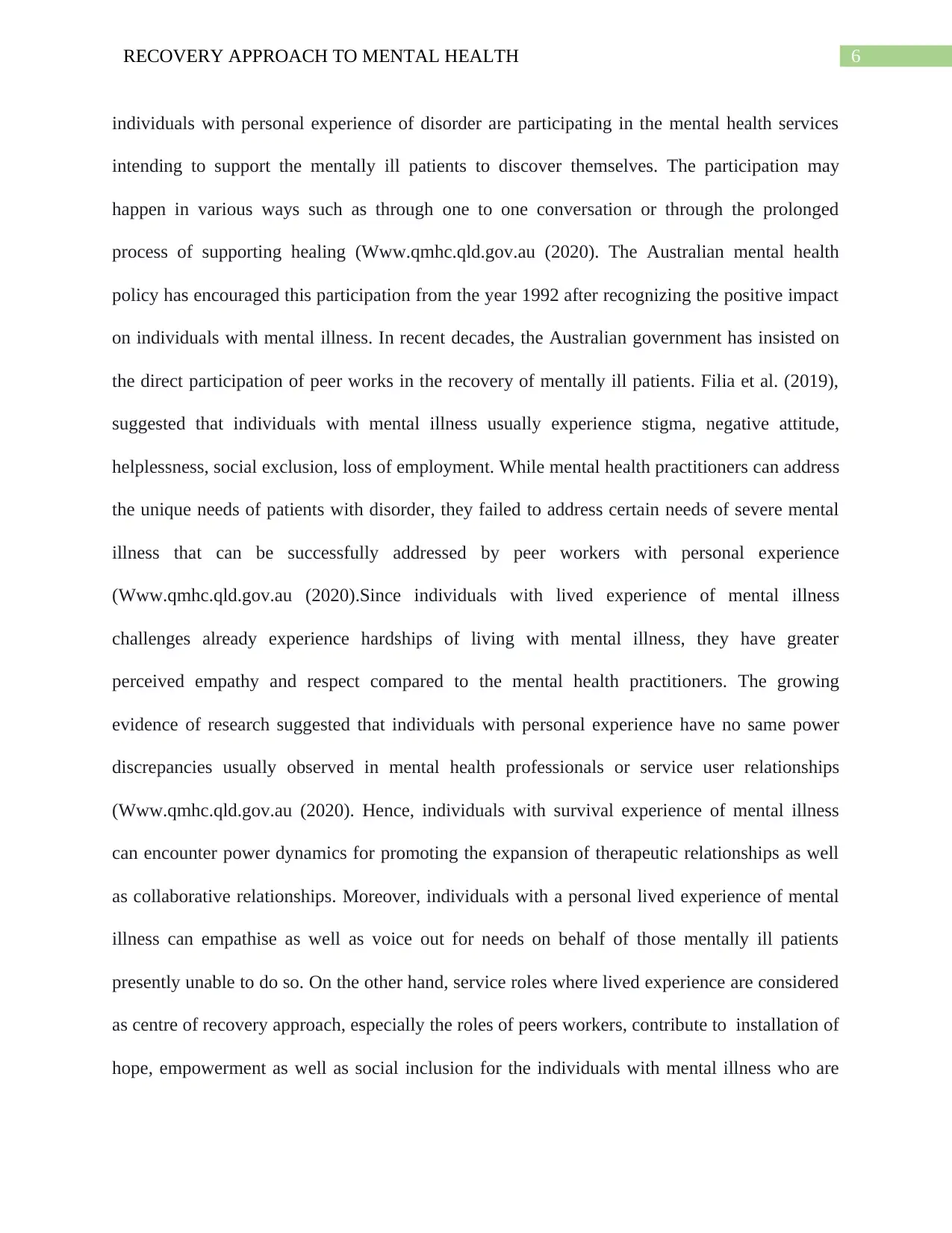
6RECOVERY APPROACH TO MENTAL HEALTH
individuals with personal experience of disorder are participating in the mental health services
intending to support the mentally ill patients to discover themselves. The participation may
happen in various ways such as through one to one conversation or through the prolonged
process of supporting healing (Www.qmhc.qld.gov.au (2020). The Australian mental health
policy has encouraged this participation from the year 1992 after recognizing the positive impact
on individuals with mental illness. In recent decades, the Australian government has insisted on
the direct participation of peer works in the recovery of mentally ill patients. Filia et al. (2019),
suggested that individuals with mental illness usually experience stigma, negative attitude,
helplessness, social exclusion, loss of employment. While mental health practitioners can address
the unique needs of patients with disorder, they failed to address certain needs of severe mental
illness that can be successfully addressed by peer workers with personal experience
(Www.qmhc.qld.gov.au (2020).Since individuals with lived experience of mental illness
challenges already experience hardships of living with mental illness, they have greater
perceived empathy and respect compared to the mental health practitioners. The growing
evidence of research suggested that individuals with personal experience have no same power
discrepancies usually observed in mental health professionals or service user relationships
(Www.qmhc.qld.gov.au (2020). Hence, individuals with survival experience of mental illness
can encounter power dynamics for promoting the expansion of therapeutic relationships as well
as collaborative relationships. Moreover, individuals with a personal lived experience of mental
illness can empathise as well as voice out for needs on behalf of those mentally ill patients
presently unable to do so. On the other hand, service roles where lived experience are considered
as centre of recovery approach, especially the roles of peers workers, contribute to installation of
hope, empowerment as well as social inclusion for the individuals with mental illness who are
individuals with personal experience of disorder are participating in the mental health services
intending to support the mentally ill patients to discover themselves. The participation may
happen in various ways such as through one to one conversation or through the prolonged
process of supporting healing (Www.qmhc.qld.gov.au (2020). The Australian mental health
policy has encouraged this participation from the year 1992 after recognizing the positive impact
on individuals with mental illness. In recent decades, the Australian government has insisted on
the direct participation of peer works in the recovery of mentally ill patients. Filia et al. (2019),
suggested that individuals with mental illness usually experience stigma, negative attitude,
helplessness, social exclusion, loss of employment. While mental health practitioners can address
the unique needs of patients with disorder, they failed to address certain needs of severe mental
illness that can be successfully addressed by peer workers with personal experience
(Www.qmhc.qld.gov.au (2020).Since individuals with lived experience of mental illness
challenges already experience hardships of living with mental illness, they have greater
perceived empathy and respect compared to the mental health practitioners. The growing
evidence of research suggested that individuals with personal experience have no same power
discrepancies usually observed in mental health professionals or service user relationships
(Www.qmhc.qld.gov.au (2020). Hence, individuals with survival experience of mental illness
can encounter power dynamics for promoting the expansion of therapeutic relationships as well
as collaborative relationships. Moreover, individuals with a personal lived experience of mental
illness can empathise as well as voice out for needs on behalf of those mentally ill patients
presently unable to do so. On the other hand, service roles where lived experience are considered
as centre of recovery approach, especially the roles of peers workers, contribute to installation of
hope, empowerment as well as social inclusion for the individuals with mental illness who are
⊘ This is a preview!⊘
Do you want full access?
Subscribe today to unlock all pages.

Trusted by 1+ million students worldwide
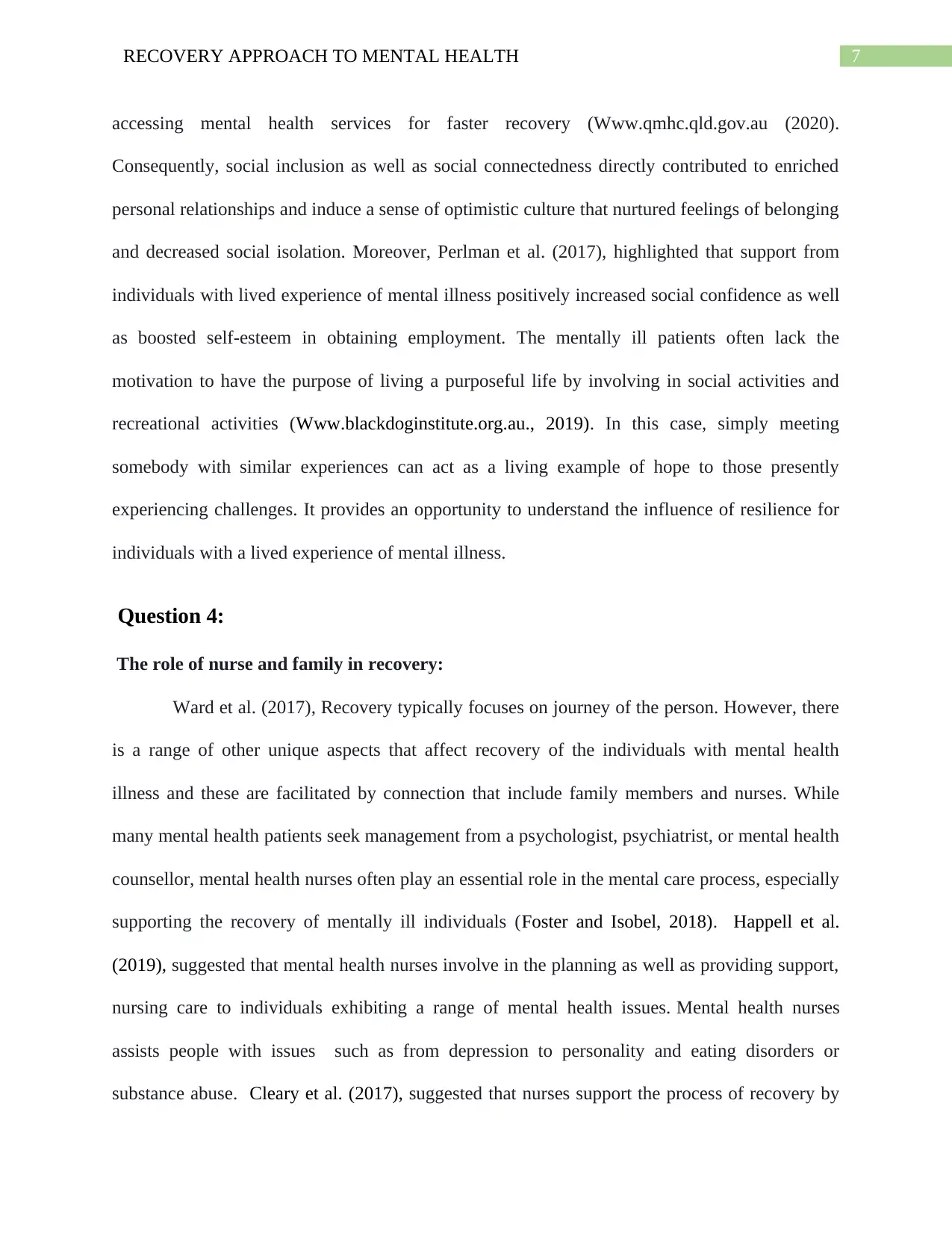
7RECOVERY APPROACH TO MENTAL HEALTH
accessing mental health services for faster recovery (Www.qmhc.qld.gov.au (2020).
Consequently, social inclusion as well as social connectedness directly contributed to enriched
personal relationships and induce a sense of optimistic culture that nurtured feelings of belonging
and decreased social isolation. Moreover, Perlman et al. (2017), highlighted that support from
individuals with lived experience of mental illness positively increased social confidence as well
as boosted self-esteem in obtaining employment. The mentally ill patients often lack the
motivation to have the purpose of living a purposeful life by involving in social activities and
recreational activities (Www.blackdoginstitute.org.au., 2019). In this case, simply meeting
somebody with similar experiences can act as a living example of hope to those presently
experiencing challenges. It provides an opportunity to understand the influence of resilience for
individuals with a lived experience of mental illness.
Question 4:
The role of nurse and family in recovery:
Ward et al. (2017), Recovery typically focuses on journey of the person. However, there
is a range of other unique aspects that affect recovery of the individuals with mental health
illness and these are facilitated by connection that include family members and nurses. While
many mental health patients seek management from a psychologist, psychiatrist, or mental health
counsellor, mental health nurses often play an essential role in the mental care process, especially
supporting the recovery of mentally ill individuals (Foster and Isobel, 2018). Happell et al.
(2019), suggested that mental health nurses involve in the planning as well as providing support,
nursing care to individuals exhibiting a range of mental health issues. Mental health nurses
assists people with issues such as from depression to personality and eating disorders or
substance abuse. Cleary et al. (2017), suggested that nurses support the process of recovery by
accessing mental health services for faster recovery (Www.qmhc.qld.gov.au (2020).
Consequently, social inclusion as well as social connectedness directly contributed to enriched
personal relationships and induce a sense of optimistic culture that nurtured feelings of belonging
and decreased social isolation. Moreover, Perlman et al. (2017), highlighted that support from
individuals with lived experience of mental illness positively increased social confidence as well
as boosted self-esteem in obtaining employment. The mentally ill patients often lack the
motivation to have the purpose of living a purposeful life by involving in social activities and
recreational activities (Www.blackdoginstitute.org.au., 2019). In this case, simply meeting
somebody with similar experiences can act as a living example of hope to those presently
experiencing challenges. It provides an opportunity to understand the influence of resilience for
individuals with a lived experience of mental illness.
Question 4:
The role of nurse and family in recovery:
Ward et al. (2017), Recovery typically focuses on journey of the person. However, there
is a range of other unique aspects that affect recovery of the individuals with mental health
illness and these are facilitated by connection that include family members and nurses. While
many mental health patients seek management from a psychologist, psychiatrist, or mental health
counsellor, mental health nurses often play an essential role in the mental care process, especially
supporting the recovery of mentally ill individuals (Foster and Isobel, 2018). Happell et al.
(2019), suggested that mental health nurses involve in the planning as well as providing support,
nursing care to individuals exhibiting a range of mental health issues. Mental health nurses
assists people with issues such as from depression to personality and eating disorders or
substance abuse. Cleary et al. (2017), suggested that nurses support the process of recovery by
Paraphrase This Document
Need a fresh take? Get an instant paraphrase of this document with our AI Paraphraser
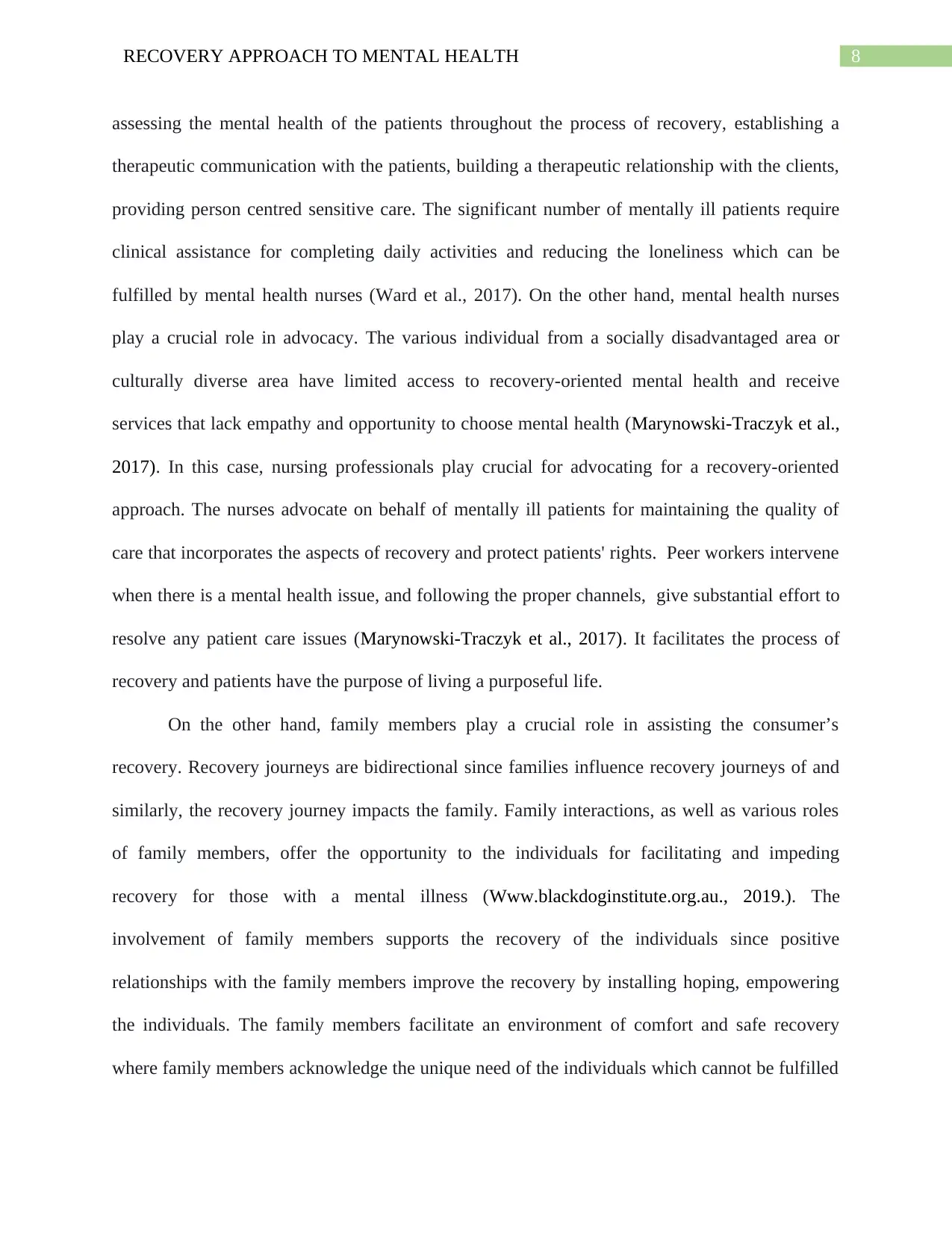
8RECOVERY APPROACH TO MENTAL HEALTH
assessing the mental health of the patients throughout the process of recovery, establishing a
therapeutic communication with the patients, building a therapeutic relationship with the clients,
providing person centred sensitive care. The significant number of mentally ill patients require
clinical assistance for completing daily activities and reducing the loneliness which can be
fulfilled by mental health nurses (Ward et al., 2017). On the other hand, mental health nurses
play a crucial role in advocacy. The various individual from a socially disadvantaged area or
culturally diverse area have limited access to recovery-oriented mental health and receive
services that lack empathy and opportunity to choose mental health (Marynowski-Traczyk et al.,
2017). In this case, nursing professionals play crucial for advocating for a recovery-oriented
approach. The nurses advocate on behalf of mentally ill patients for maintaining the quality of
care that incorporates the aspects of recovery and protect patients' rights. Peer workers intervene
when there is a mental health issue, and following the proper channels, give substantial effort to
resolve any patient care issues (Marynowski-Traczyk et al., 2017). It facilitates the process of
recovery and patients have the purpose of living a purposeful life.
On the other hand, family members play a crucial role in assisting the consumer’s
recovery. Recovery journeys are bidirectional since families influence recovery journeys of and
similarly, the recovery journey impacts the family. Family interactions, as well as various roles
of family members, offer the opportunity to the individuals for facilitating and impeding
recovery for those with a mental illness (Www.blackdoginstitute.org.au., 2019.). The
involvement of family members supports the recovery of the individuals since positive
relationships with the family members improve the recovery by installing hoping, empowering
the individuals. The family members facilitate an environment of comfort and safe recovery
where family members acknowledge the unique need of the individuals which cannot be fulfilled
assessing the mental health of the patients throughout the process of recovery, establishing a
therapeutic communication with the patients, building a therapeutic relationship with the clients,
providing person centred sensitive care. The significant number of mentally ill patients require
clinical assistance for completing daily activities and reducing the loneliness which can be
fulfilled by mental health nurses (Ward et al., 2017). On the other hand, mental health nurses
play a crucial role in advocacy. The various individual from a socially disadvantaged area or
culturally diverse area have limited access to recovery-oriented mental health and receive
services that lack empathy and opportunity to choose mental health (Marynowski-Traczyk et al.,
2017). In this case, nursing professionals play crucial for advocating for a recovery-oriented
approach. The nurses advocate on behalf of mentally ill patients for maintaining the quality of
care that incorporates the aspects of recovery and protect patients' rights. Peer workers intervene
when there is a mental health issue, and following the proper channels, give substantial effort to
resolve any patient care issues (Marynowski-Traczyk et al., 2017). It facilitates the process of
recovery and patients have the purpose of living a purposeful life.
On the other hand, family members play a crucial role in assisting the consumer’s
recovery. Recovery journeys are bidirectional since families influence recovery journeys of and
similarly, the recovery journey impacts the family. Family interactions, as well as various roles
of family members, offer the opportunity to the individuals for facilitating and impeding
recovery for those with a mental illness (Www.blackdoginstitute.org.au., 2019.). The
involvement of family members supports the recovery of the individuals since positive
relationships with the family members improve the recovery by installing hoping, empowering
the individuals. The family members facilitate an environment of comfort and safe recovery
where family members acknowledge the unique need of the individuals which cannot be fulfilled

9RECOVERY APPROACH TO MENTAL HEALTH
by the mental health nurses (Marynowski-Traczyk et al., 2017). Hence, family support enables
mutual support and development constructive problem to solve approach.
by the mental health nurses (Marynowski-Traczyk et al., 2017). Hence, family support enables
mutual support and development constructive problem to solve approach.
⊘ This is a preview!⊘
Do you want full access?
Subscribe today to unlock all pages.

Trusted by 1+ million students worldwide
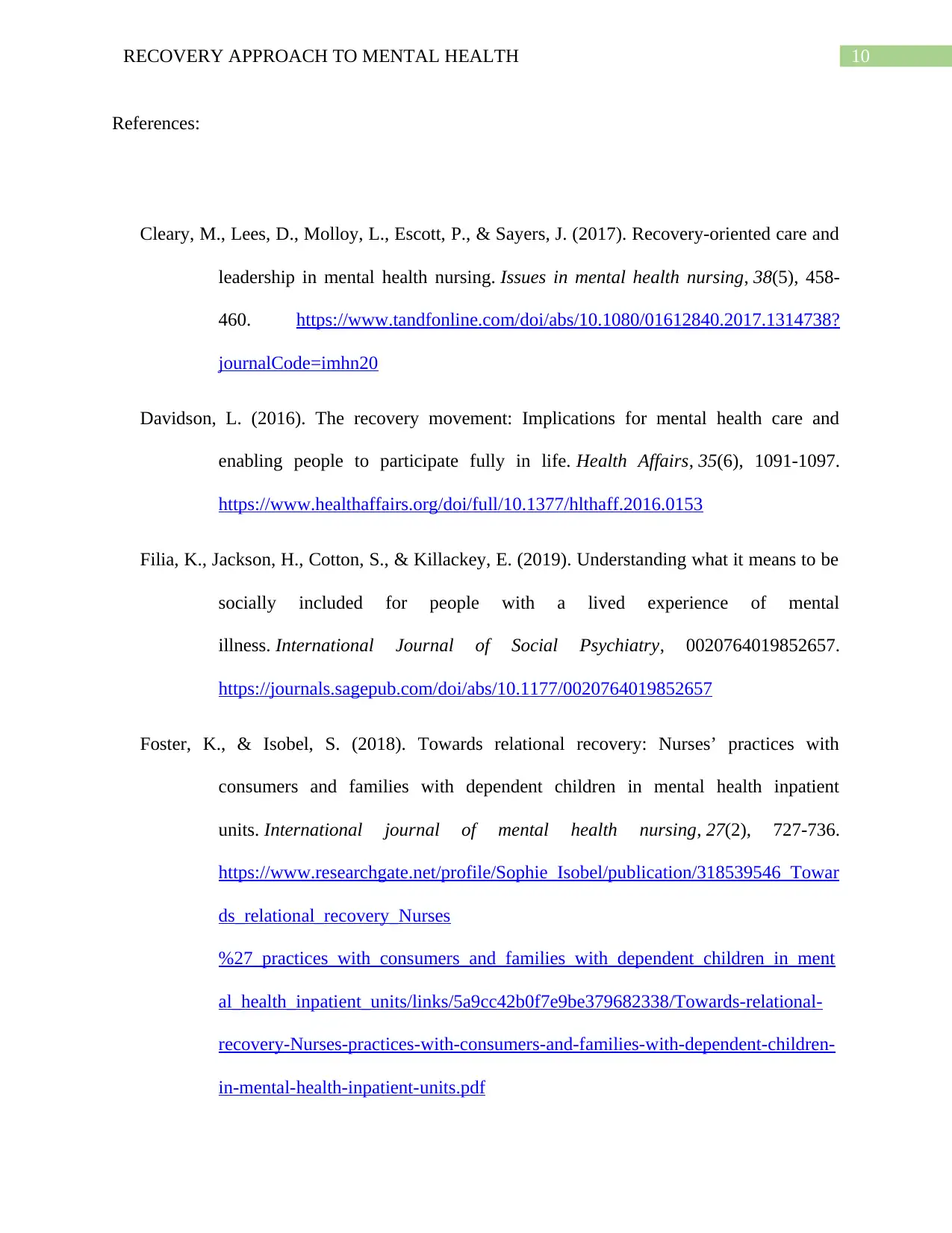
10RECOVERY APPROACH TO MENTAL HEALTH
References:
Cleary, M., Lees, D., Molloy, L., Escott, P., & Sayers, J. (2017). Recovery-oriented care and
leadership in mental health nursing. Issues in mental health nursing, 38(5), 458-
460. https://www.tandfonline.com/doi/abs/10.1080/01612840.2017.1314738?
journalCode=imhn20
Davidson, L. (2016). The recovery movement: Implications for mental health care and
enabling people to participate fully in life. Health Affairs, 35(6), 1091-1097.
https://www.healthaffairs.org/doi/full/10.1377/hlthaff.2016.0153
Filia, K., Jackson, H., Cotton, S., & Killackey, E. (2019). Understanding what it means to be
socially included for people with a lived experience of mental
illness. International Journal of Social Psychiatry, 0020764019852657.
https://journals.sagepub.com/doi/abs/10.1177/0020764019852657
Foster, K., & Isobel, S. (2018). Towards relational recovery: Nurses’ practices with
consumers and families with dependent children in mental health inpatient
units. International journal of mental health nursing, 27(2), 727-736.
https://www.researchgate.net/profile/Sophie_Isobel/publication/318539546_Towar
ds_relational_recovery_Nurses
%27_practices_with_consumers_and_families_with_dependent_children_in_ment
al_health_inpatient_units/links/5a9cc42b0f7e9be379682338/Towards-relational-
recovery-Nurses-practices-with-consumers-and-families-with-dependent-children-
in-mental-health-inpatient-units.pdf
References:
Cleary, M., Lees, D., Molloy, L., Escott, P., & Sayers, J. (2017). Recovery-oriented care and
leadership in mental health nursing. Issues in mental health nursing, 38(5), 458-
460. https://www.tandfonline.com/doi/abs/10.1080/01612840.2017.1314738?
journalCode=imhn20
Davidson, L. (2016). The recovery movement: Implications for mental health care and
enabling people to participate fully in life. Health Affairs, 35(6), 1091-1097.
https://www.healthaffairs.org/doi/full/10.1377/hlthaff.2016.0153
Filia, K., Jackson, H., Cotton, S., & Killackey, E. (2019). Understanding what it means to be
socially included for people with a lived experience of mental
illness. International Journal of Social Psychiatry, 0020764019852657.
https://journals.sagepub.com/doi/abs/10.1177/0020764019852657
Foster, K., & Isobel, S. (2018). Towards relational recovery: Nurses’ practices with
consumers and families with dependent children in mental health inpatient
units. International journal of mental health nursing, 27(2), 727-736.
https://www.researchgate.net/profile/Sophie_Isobel/publication/318539546_Towar
ds_relational_recovery_Nurses
%27_practices_with_consumers_and_families_with_dependent_children_in_ment
al_health_inpatient_units/links/5a9cc42b0f7e9be379682338/Towards-relational-
recovery-Nurses-practices-with-consumers-and-families-with-dependent-children-
in-mental-health-inpatient-units.pdf
Paraphrase This Document
Need a fresh take? Get an instant paraphrase of this document with our AI Paraphraser
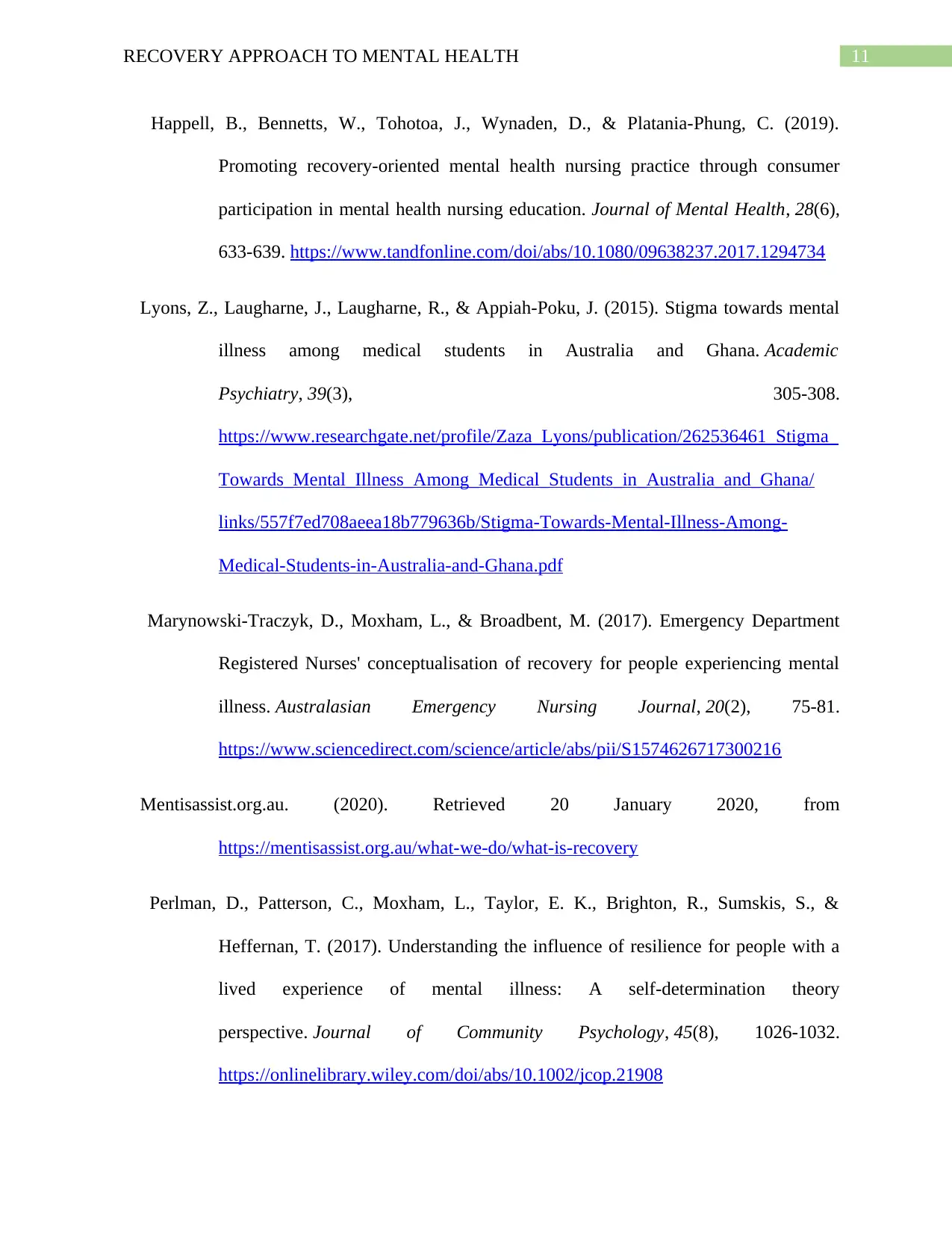
11RECOVERY APPROACH TO MENTAL HEALTH
Happell, B., Bennetts, W., Tohotoa, J., Wynaden, D., & Platania-Phung, C. (2019).
Promoting recovery-oriented mental health nursing practice through consumer
participation in mental health nursing education. Journal of Mental Health, 28(6),
633-639. https://www.tandfonline.com/doi/abs/10.1080/09638237.2017.1294734
Lyons, Z., Laugharne, J., Laugharne, R., & Appiah-Poku, J. (2015). Stigma towards mental
illness among medical students in Australia and Ghana. Academic
Psychiatry, 39(3), 305-308.
https://www.researchgate.net/profile/Zaza_Lyons/publication/262536461_Stigma_
Towards_Mental_Illness_Among_Medical_Students_in_Australia_and_Ghana/
links/557f7ed708aeea18b779636b/Stigma-Towards-Mental-Illness-Among-
Medical-Students-in-Australia-and-Ghana.pdf
Marynowski-Traczyk, D., Moxham, L., & Broadbent, M. (2017). Emergency Department
Registered Nurses' conceptualisation of recovery for people experiencing mental
illness. Australasian Emergency Nursing Journal, 20(2), 75-81.
https://www.sciencedirect.com/science/article/abs/pii/S1574626717300216
Mentisassist.org.au. (2020). Retrieved 20 January 2020, from
https://mentisassist.org.au/what-we-do/what-is-recovery
Perlman, D., Patterson, C., Moxham, L., Taylor, E. K., Brighton, R., Sumskis, S., &
Heffernan, T. (2017). Understanding the influence of resilience for people with a
lived experience of mental illness: A self‐determination theory
perspective. Journal of Community Psychology, 45(8), 1026-1032.
https://onlinelibrary.wiley.com/doi/abs/10.1002/jcop.21908
Happell, B., Bennetts, W., Tohotoa, J., Wynaden, D., & Platania-Phung, C. (2019).
Promoting recovery-oriented mental health nursing practice through consumer
participation in mental health nursing education. Journal of Mental Health, 28(6),
633-639. https://www.tandfonline.com/doi/abs/10.1080/09638237.2017.1294734
Lyons, Z., Laugharne, J., Laugharne, R., & Appiah-Poku, J. (2015). Stigma towards mental
illness among medical students in Australia and Ghana. Academic
Psychiatry, 39(3), 305-308.
https://www.researchgate.net/profile/Zaza_Lyons/publication/262536461_Stigma_
Towards_Mental_Illness_Among_Medical_Students_in_Australia_and_Ghana/
links/557f7ed708aeea18b779636b/Stigma-Towards-Mental-Illness-Among-
Medical-Students-in-Australia-and-Ghana.pdf
Marynowski-Traczyk, D., Moxham, L., & Broadbent, M. (2017). Emergency Department
Registered Nurses' conceptualisation of recovery for people experiencing mental
illness. Australasian Emergency Nursing Journal, 20(2), 75-81.
https://www.sciencedirect.com/science/article/abs/pii/S1574626717300216
Mentisassist.org.au. (2020). Retrieved 20 January 2020, from
https://mentisassist.org.au/what-we-do/what-is-recovery
Perlman, D., Patterson, C., Moxham, L., Taylor, E. K., Brighton, R., Sumskis, S., &
Heffernan, T. (2017). Understanding the influence of resilience for people with a
lived experience of mental illness: A self‐determination theory
perspective. Journal of Community Psychology, 45(8), 1026-1032.
https://onlinelibrary.wiley.com/doi/abs/10.1002/jcop.21908
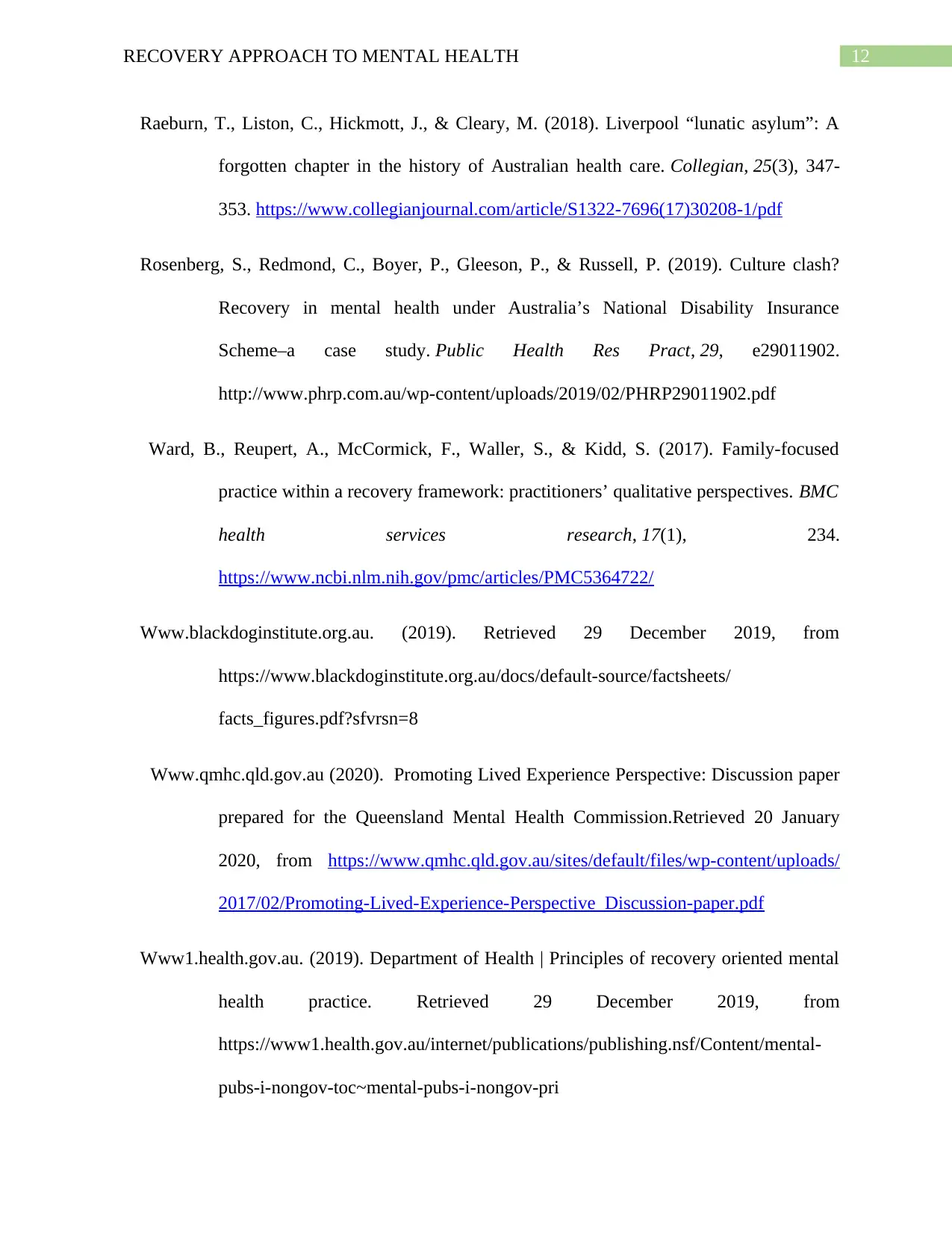
12RECOVERY APPROACH TO MENTAL HEALTH
Raeburn, T., Liston, C., Hickmott, J., & Cleary, M. (2018). Liverpool “lunatic asylum”: A
forgotten chapter in the history of Australian health care. Collegian, 25(3), 347-
353. https://www.collegianjournal.com/article/S1322-7696(17)30208-1/pdf
Rosenberg, S., Redmond, C., Boyer, P., Gleeson, P., & Russell, P. (2019). Culture clash?
Recovery in mental health under Australia’s National Disability Insurance
Scheme–a case study. Public Health Res Pract, 29, e29011902.
http://www.phrp.com.au/wp-content/uploads/2019/02/PHRP29011902.pdf
Ward, B., Reupert, A., McCormick, F., Waller, S., & Kidd, S. (2017). Family-focused
practice within a recovery framework: practitioners’ qualitative perspectives. BMC
health services research, 17(1), 234.
https://www.ncbi.nlm.nih.gov/pmc/articles/PMC5364722/
Www.blackdoginstitute.org.au. (2019). Retrieved 29 December 2019, from
https://www.blackdoginstitute.org.au/docs/default-source/factsheets/
facts_figures.pdf?sfvrsn=8
Www.qmhc.qld.gov.au (2020). Promoting Lived Experience Perspective: Discussion paper
prepared for the Queensland Mental Health Commission.Retrieved 20 January
2020, from https://www.qmhc.qld.gov.au/sites/default/files/wp-content/uploads/
2017/02/Promoting-Lived-Experience-Perspective_Discussion-paper.pdf
Www1.health.gov.au. (2019). Department of Health | Principles of recovery oriented mental
health practice. Retrieved 29 December 2019, from
https://www1.health.gov.au/internet/publications/publishing.nsf/Content/mental-
pubs-i-nongov-toc~mental-pubs-i-nongov-pri
Raeburn, T., Liston, C., Hickmott, J., & Cleary, M. (2018). Liverpool “lunatic asylum”: A
forgotten chapter in the history of Australian health care. Collegian, 25(3), 347-
353. https://www.collegianjournal.com/article/S1322-7696(17)30208-1/pdf
Rosenberg, S., Redmond, C., Boyer, P., Gleeson, P., & Russell, P. (2019). Culture clash?
Recovery in mental health under Australia’s National Disability Insurance
Scheme–a case study. Public Health Res Pract, 29, e29011902.
http://www.phrp.com.au/wp-content/uploads/2019/02/PHRP29011902.pdf
Ward, B., Reupert, A., McCormick, F., Waller, S., & Kidd, S. (2017). Family-focused
practice within a recovery framework: practitioners’ qualitative perspectives. BMC
health services research, 17(1), 234.
https://www.ncbi.nlm.nih.gov/pmc/articles/PMC5364722/
Www.blackdoginstitute.org.au. (2019). Retrieved 29 December 2019, from
https://www.blackdoginstitute.org.au/docs/default-source/factsheets/
facts_figures.pdf?sfvrsn=8
Www.qmhc.qld.gov.au (2020). Promoting Lived Experience Perspective: Discussion paper
prepared for the Queensland Mental Health Commission.Retrieved 20 January
2020, from https://www.qmhc.qld.gov.au/sites/default/files/wp-content/uploads/
2017/02/Promoting-Lived-Experience-Perspective_Discussion-paper.pdf
Www1.health.gov.au. (2019). Department of Health | Principles of recovery oriented mental
health practice. Retrieved 29 December 2019, from
https://www1.health.gov.au/internet/publications/publishing.nsf/Content/mental-
pubs-i-nongov-toc~mental-pubs-i-nongov-pri
⊘ This is a preview!⊘
Do you want full access?
Subscribe today to unlock all pages.

Trusted by 1+ million students worldwide
1 out of 13
Related Documents
Your All-in-One AI-Powered Toolkit for Academic Success.
+13062052269
info@desklib.com
Available 24*7 on WhatsApp / Email
![[object Object]](/_next/static/media/star-bottom.7253800d.svg)
Unlock your academic potential
Copyright © 2020–2026 A2Z Services. All Rights Reserved. Developed and managed by ZUCOL.





